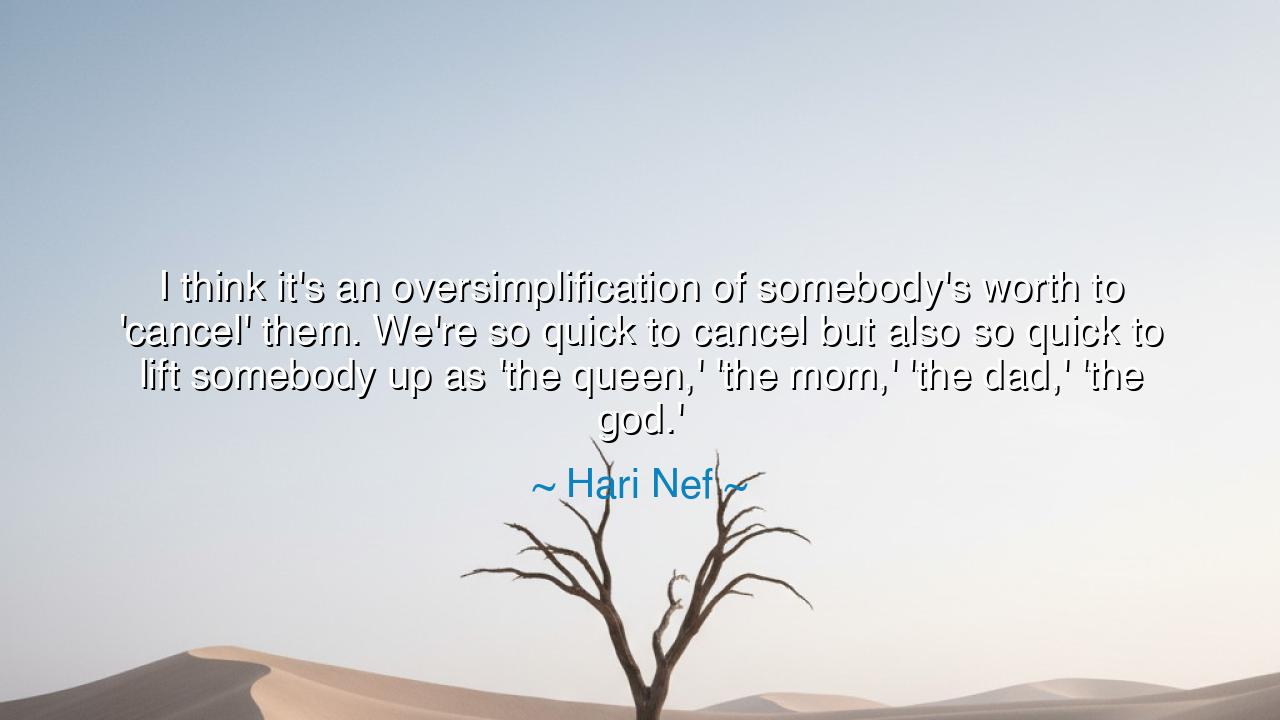
I think it's an oversimplification of somebody's worth to
I think it's an oversimplification of somebody's worth to 'cancel' them. We're so quick to cancel but also so quick to lift somebody up as 'the queen,' 'the mom,' 'the dad,' 'the god.'






The words of Hari Nef, “I think it’s an oversimplification of somebody’s worth to ‘cancel’ them. We’re so quick to cancel but also so quick to lift somebody up as ‘the queen,’ ‘the mom,’ ‘the dad,’ ‘the god,’” speak with the wisdom of one who has seen both the heights and depths of the human gaze. These words are not merely about fame or reputation — they are about human judgment, the fragile balance between adoration and condemnation, between worship and rejection. In this reflection lies a timeless truth: that the spirit of the crowd has always been both fickle and fierce, capable of deifying one moment and destroying the next.
To “cancel” someone is a modern phrase, but the impulse behind it is ancient. The Romans called it damnatio memoriae, the erasure of a person’s name and legacy, the stripping away of dignity as if they had never existed. Yet the same crowds that condemned could just as easily raise a person to the status of a god. The ancients understood that the adoration of the masses is as dangerous as their scorn, for both are born not of understanding, but of impulse. Hari Nef’s words remind us that to judge a person wholly by a moment — whether to exalt or to erase — is to deny their humanity. For every soul is a tapestry of light and shadow, of triumph and error, and cannot be reduced to a single act or image.
The ancients told stories that warned of this truth. Consider the tale of Socrates, the great philosopher of Athens, whose wisdom shaped the world for millennia. In his lifetime, he was both revered and reviled — hailed as a sage by some, condemned as a corrupter by others. The same city that had once honored his intellect later sentenced him to death, forcing him to drink hemlock for daring to question too deeply. His story endures as a warning: the crowd’s love is fleeting, and its hatred just as blind. What we lift up too high, we often cast down with equal force.
Hari Nef speaks, too, of oversimplification — the human tendency to flatten the complexity of others into symbols. We do not see people as they are; we see them as reflections of what we desire or despise. To call someone “the queen,” “the god,” or “the mom” is to turn them into an idea rather than a being — to worship the image while ignoring the person behind it. The ancients would have recognized this as idolatry of the spirit: the mistake of confusing the mask for the soul. True wisdom demands we see both — the beauty and the flaw, the shadow behind the light.
Yet her words are not a condemnation of accountability or admiration. Rather, they are a plea for balance and compassion. For to cancel without understanding is to forget that every human being is a work in progress, shaped by time, error, and growth. Likewise, to worship without discernment is to blind ourselves to truth. The wise among the ancients — like Marcus Aurelius, the philosopher-king — taught that we must never let praise or blame define our worth. “If fame comes,” he wrote, “let it be as the shadow of virtue, not its substance.” In this, we see harmony with Nef’s message: that the measure of a soul lies not in the world’s judgment, but in their character and their capacity for change.
We live in an age where the power of speech has multiplied — where a single word can lift a person to greatness or cast them into ruin. But the ancients would ask us to remember that mercy is the highest form of strength. To understand before we condemn, to reflect before we praise — these are the marks of a mature spirit. The one who can see the whole of a person, and not merely the part that offends or dazzles, walks the path of wisdom.
So, my children of tomorrow, take this lesson to heart: do not let the winds of the crowd rule your judgment. Do not rush to cancel, nor rush to crown. Look deeply before you speak, and remember that every person you see carries unseen battles, unseen pain, unseen redemption. Be neither the blind worshipper nor the eager executioner. Instead, be the seeker — the one who looks beyond the surface and finds the soul beneath.
For as Hari Nef teaches us, to see others truly is to honor the fullness of their humanity — their flaws, their growth, their grace. Let your words build bridges, not pyres. Let your discernment be tempered with kindness. For only when we learn to see each other not as gods or villains, but as imperfect travelers upon the same road, will we truly begin to understand the divine art of being human.






AAdministratorAdministrator
Welcome, honored guests. Please leave a comment, we will respond soon